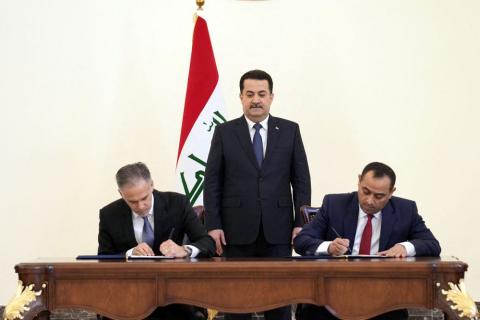
Political efforts to form the largest bloc at parliament have not stopped despite the popular rallies that have swept many parts of Iraq and Sairoun alliance leader Moqtada al-Sadr’s call that these consultations come to a halt until protester demands are met.
His call, however, fell on deaf ears and political forces and leaderships have forged ahead with their attempts to form the largest bloc.
An informed source told Asharq Al-Awsat that understandings between Shiite and Kurdish powers are ongoing to form this coalition.
A Shiite politician said that all Shiite powers, the Sairoun, Fateh, Nasr, State of Law and Hikma, want the next government to include Shiite, Sunni and Kurdish blocs to avoid the marginalization of any side.
Shiite delegations had been dispatched to the Iraqi Kurdistan Region to hold consultations with local officials, starting with Kurdistan Democratic Party leader Masoud Barzani. Kurdish delegations were also sent to Baghdad to meet prominent Shiite leaders.
The Shiite politician said efforts are aimed at reaching a common vision that would revive the so-called historic Shiite-Kurdish alliance that was harmed during Prime Minister Nouri al-Maliki’s second term in office between 2010 and 2014. The ties were also damaged in 2017 in wake of outgoing Prime Minister Haidar al-Abadi’s opposition to the Kurdish independence referendum.
The informed source stressed that Barzani sought throughout his meetings to restore ties to the way they were when the Shiite-Kurdish alliance was struck.
Barzani’s negative experience with Abadi in wake of last year’s referendum may however be an obstacle in reaching this goal. He may therefore lean towards striking an alliance with Fateh coalition leader Hadi al-Ameri, whom he enjoys good ties with, instead of Abadi, said the source.
The Shiite politician revealed that recent consultations now put the Fateh coalition as the largest bloc in parliament, not the Sairoun, which had emerged as the shock victor in the May parliamentary elections.
After striking various political deals, the Fateh bloc now boasts 60 lawmakers, while Sairoun has 45.
The State of Law alliance is now part of the Fateh bloc, as are various Kurdish figures. Efforts are underway to bring in the Sairoun alliance, revealed the politician. Sunnis are also not being excluded.
Abadi’s Nasr alliance has been approached to join the largest bloc, but the PM has not yet taken a decision on the matter, which may jeopardize his representation at the legislature. No less than 28 of his alliance members may opt to join the largest bloc, said the Shiite official.
Despite their reservations against some of the Shiite figures in this bloc, Kurdish lawmakers may consent to join it because they would like to avoid becoming part of the opposition. This move may allow them to bolster their historic alliance with Shiites in a hope that they may eventually reap concessions from them in return to at least obtain some of their demands, continued the official.
As for Sunni powers, MP Mohammed al-Karbouli said that even though they have been part of these recent political consultations, Shiite-Kurdish agreements will likely be struck at their expense.
Atheel al-Nujaifi, of the Decision alliance, told Asharq Al-Awsat that the Sunnis will be part of the largest parliamentary bloc.
“We do not want to return to sectarian divisions,” he stressed.
On Sunni-Kurdish ties, he said: “There are few disputes in this relationship and they can be resolved.”












